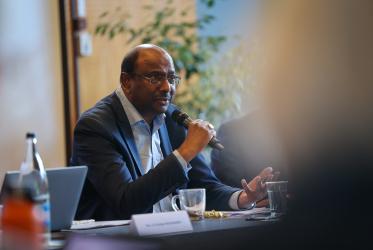Receptive ecumenism is a methodology emphasizing receptivity, learning, and listening. Since its inception, the concept has taken root in many diverse contexts around the globe.
The conference explored the ecclesiological reparative, critical constructive task of ecumenical ecclesiology that was introduced in the previous conferences.
The 2022 conference took this process a step further as participants reflected on the transformative impact of receptive ecumenism as an instrument for ecclesial transformation.
They offered reflections on the question: "To which extent are the churches willing to listen to what the Spirit is saying?”
Rev. Dr Susan Durber, moderator of the World Council of Churches (WCC) Commission on Faith and order, expressed her delight at meeting so many people interested in pursuing ecumenical adventures in new ways, and finding them willing and ready to support the WCC in its work.
“If receptive ecumenism is about transformative learning from our ecclesial others, if it is about growth in relationship with God and with each other, if it is a Spirit-filled sharing in the fulness of Christ, then I want to say that this is exactly what I long for, and am working for, too, and indeed have always been – and it is what I pray for for others.,” said Durber. “One of the things that the ecumenical journey often begins with is the breaking down of caricatures and stereotypes.”
It cannot end there, but it must often begin there, reflected Durber. “So, I want to begin with the breaking down of some of the stereotypes of Faith and Order, some of which, admittedly we sometimes even peddle ourselves,” she said. “I want to show that in this part of the ecumenical movement there is already some transformative learning going on.”
Faith and Order has always been about enabling the churches to call one another to visible unity in common faith, in sacramental life, and in ministry and mission, said Durber.
“The formal ecumenical movement (in so far as it is actually really formal) has also often been criticised for separating out doctrine from action, justice and peace from life and work, mission from unity,” she said. “This is a perceptive criticism – these kinds of separations and silos have damaged the movement and have prevented some vital conversations.”
But there have always been ways in which these separations have simply not held and ways in which they have been constantly and faithfully subverted, she added. “And if ever one of these tries to do ecumenism without the others, then we are in trouble,” she said. “The challenge is, of course, to hear one another as fully as human beings can and to resist the caricatures of one another that sometimes we might be tempted to hide behind, and to build the relationships over years that truly enable that to happen.”
Rev. Dr Risto Jukko, director of the WCC Commission on World Mission and Evangelism, spoke on “From Ecumenical Winter Towards Post-Denominational Spring of Renewal.”
Jukko described the immediate focus not so much on potential convergence points or on the goal of ”traditional ecumenism” but on the ecclesial learning and individual growth in dialogue with others.
The main question is “What can we learn, or receive, with integrity from our various ‘others’ in order to facilitate our own growth together into deepened communion in Christ and the Spirit?” Jukko said. “Is this a dimension of discipleship? A disciple is a learner and is still on the way to full conversion or change or transformation.”
Jukko added: “Receptive ecumenism and mission need each other and are mutually dependent.”
WCC publication - "Sharing and Learning - Bible, Mission, and Receptive Ecumenism"








